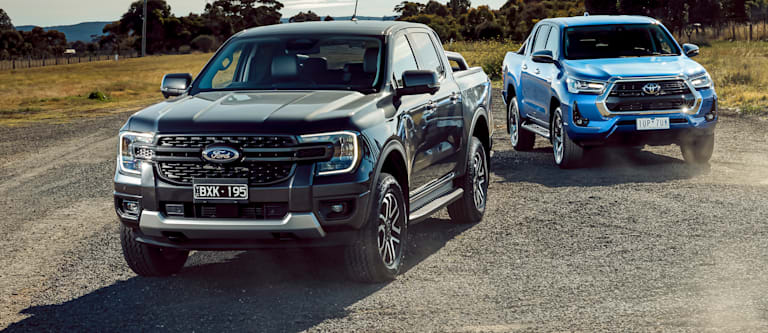
The 2023 Ford Ranger arrives at a time when the previous model was still one of the leading vehicles in the mid-size 4x4 ute category. Ford’s Ranger has been in an arm wrestle with the venerable Toyota Hilux for the title, of not only Australia’s favourite 4x4 vehicles but the top-selling model in the county overall for the past few years, and this ‘Next-Gen’ Ranger is Ford’s latest salvo in the battle.
Not only is the latest Ranger almost all-new, but its trump card is the inclusion of a V6 diesel engine. The 4x4 ute category is mostly powered by four-cylinder diesel engines and the introduction of the new V6 mill is akin to bringing bazooka to a gun fight.
Also bolstering Ford’s armoury is a new model in the range. The Ranger Sport slips in to the line-up between the popular XLT model and the top of the range Wildtrak to give ute buyers another choice in style and equipment levels.
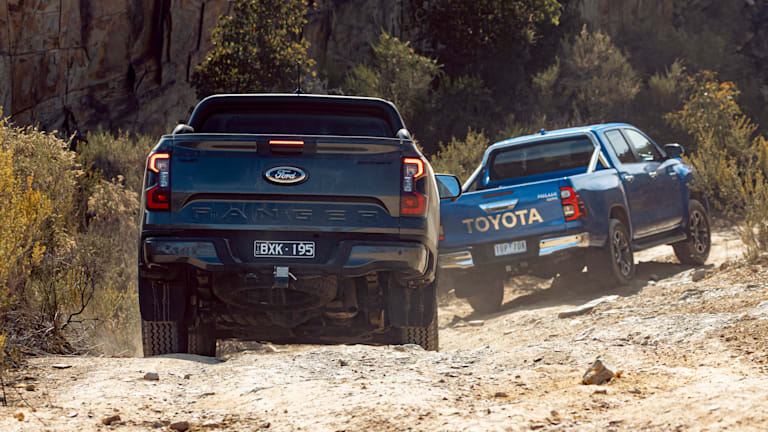
We’ve got a Ranger Sport with the V6 diesel engine, which sells for $66,690 plus ORC, and pitted it against the popular Hilux SR5 which, when fitted with the Premium package that gives it leather-trimmed seats, sells for $63,320 plus ORC.
You might say the $3300 price difference puts the new Ford at a disadvantage to the Toyota, but when you consider that the Ranger Sport is available with either the carried over I4 bi-turbo diesel engine or the V6 diesel which is a $3000 extra, the two models are close to on par in everything bar the powertrains.
Using the respective manufacturers’ online configurators, the Hilux as tested would be a $68,477 drive-away price in Melbourne, while the Ranger Sport as tested would be $73,261 drive away.
Let the battle begin!
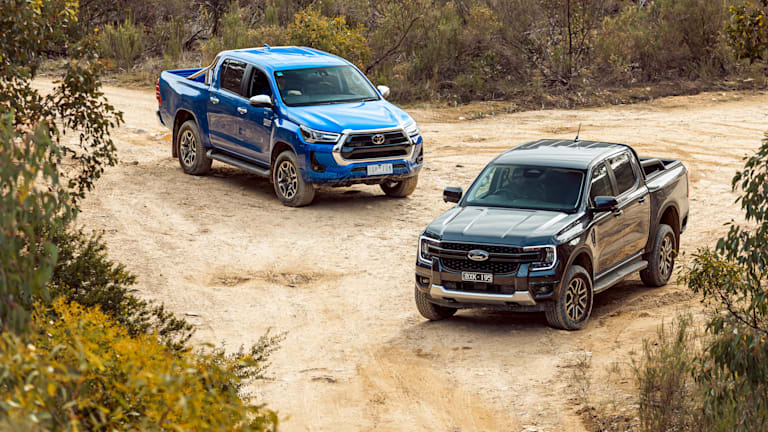
Ford Ranger Sport V6
THE 2023 Ranger is just about all new from the ground up. The central body structure including the cabin, door openings and glasshouse are close to the same as the old Ranger with a few tweaks, while everything else – including the chassis, sheet metal, interior, powertrains, cargo tub and suspension – are either new or heavily revised.
As mentioned, the I4 engine is carried over as well, but we’re driving the V6 here.
So its fair to call the new Ranger all-new and everything Ford has done in updating the Ranger has been done to improve what was already an award-winning package, with many of the changes based on customer and user feedback.
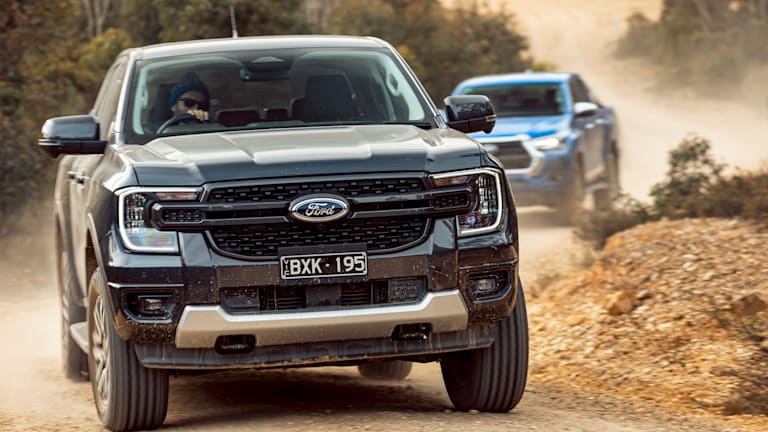
Powertrain and performance
Ford pulled its 3.0-litre ‘Lion’ V6 engine out of retirement for the latest Ranger. This engine can trace its lineage back to the Land Rover Discovery 3 and Ford Territory diesel where it was used in 2.7-litre capacity, and since then via many Land Rover and Range Rover products as a 3.0-litre with single- and dual-turbocharger induction systems.
It was used most recently in the Ford F-150 Power Stroke in a tune very similar to how it appears now in Ranger.
That tune gives us 184kW of power and 600Nm of torque, so it’s a relatively mild tune considering its capacity yet it eclipses the 147kW and 470Nm of the 3.2-litre engine it replaces in the Ranger.
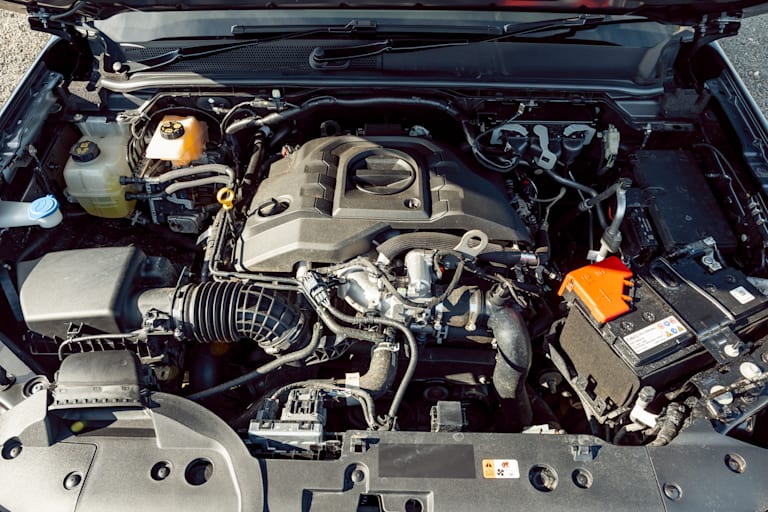
By far the biggest element the V6 brings to the Ranger and 4x4 ute category, is a level of refinement previously only seen in the soon to be superseded Volkswagen Amarok and the departed Mercedes-Benz X350d.
The 4x4 ute pack is mainly powered by in-line four-cylinder diesel engines which are inherently rough running and noisy in their operation. The V6 on the other hand is smooth, quiet and refined when compared to the four-pots, and delivers its performance in a more relaxed and well-mannered fashion.
The best of the four-cylinder ute engines, including Ford’s own bi-turbo 2.0-litre and Toyota’s 2.8-litre as found in the Hilux, make a healthy 500Nm of torque but need to be worked hard to achieve that and this is where they are rough and raucous.
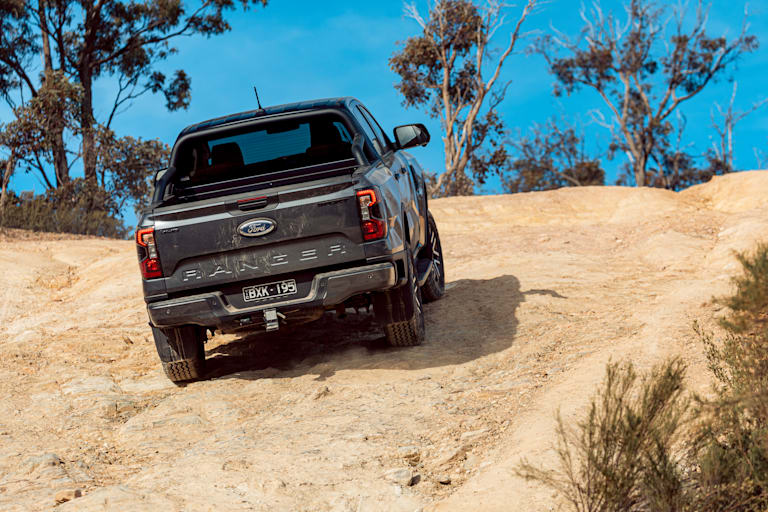
The design and capacity of the 3.0L V6 engine means that it doesn’t suffer anywhere near the noise and vibration of the in-line fours.
On the road and tracks the V6 delivers its grunt seamlessly through Ford’s 10-speed automatic transmission which has been heavily revised for this new application.
The transmission doesn’t exhibit any of the hesitancy or indecision of the previous generation of this same transmission as found in the PX series Rangers and performs faultlessly on highways and secondary roads.
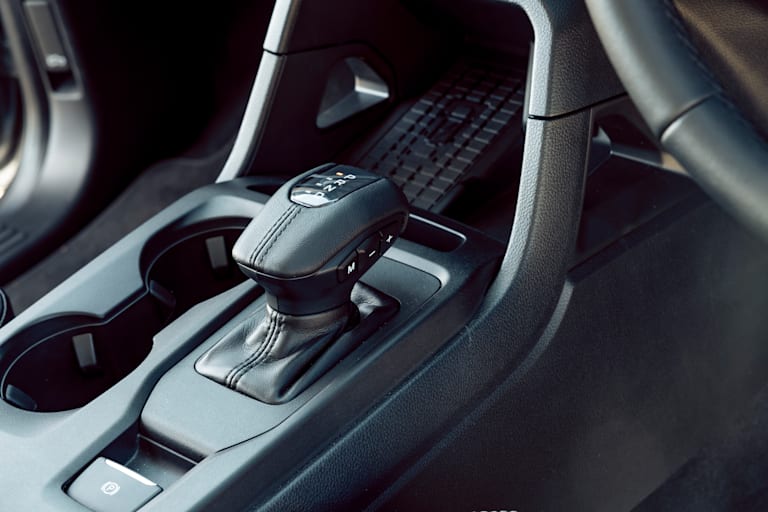
On-road ride and handling
The Ranger’s ladder-frame chassis has been made wider for a number of reasons, including fitting the V6 engine up front and widening the wheel track for improved dynamics. Down the track, this wider chassis will also aid fitting EV drivetrains.
For now, the 50mm extra width in the wheel track and equal amount added to the length of the wheelbase, are felt in the vehicle’s stability and ride control.
The track width takes the wheels out to the extremes of the body which benefits both ride and handling, as does moving the rear shock absorbers to the outside of the chassis rails where they have more leverage on the axle.
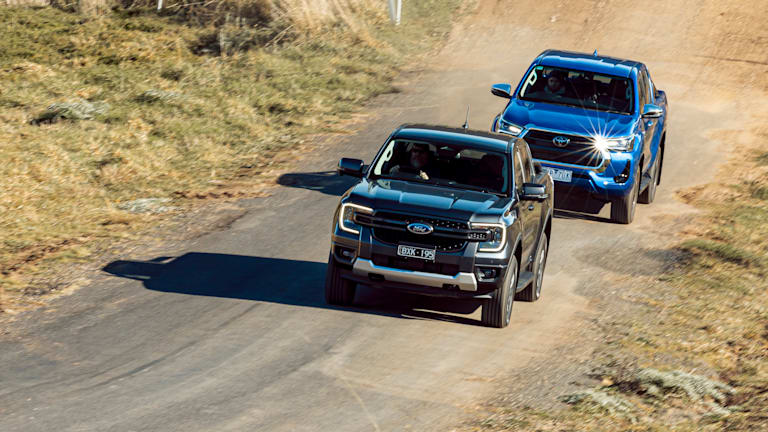
The changes and increased dimensions give the Ranger a more sure-footed and controlled presence on the road, adding to the feeling of it being a bigger truck.
The coil front and leaf-spring rear suspension feels firm over rough roads, but never jittery or uncomfortable. This is the price you pay in a vehicle designed to carry a tonne or tow 3.5-tonnes.
The full-time 4x4 system of the new Ranger is a benefit on rough tracks and wet roads, where it also improves the sure-footedness of the chassis. It’s also handy in the suburbs where, on wet roads, part-time systems in 2WD are prone to wheelspin when pulling out in to traffic or when towing heaving loads.
Off road
Those chassis modifications also benefit the Ranger off road, allowing for more articulation of the rear axle to keep the wheels on the ground in uneven terrain. The Ranger has never really suffered in this regard, but it is now better than it was in the outgoing model. The independent front end still suffers a bit and picks up wheels quite easily.
For when those tyres do lose traction with the terrain, the Ranger has an effective electronic traction control system (ETC) which remains active if and when you engage the standard rear differential lock (RDL). The ETC still isn’t as fast in action as the system in the Hilux which has always been the standard setter.
Heading along a rut up a steep, loose surface, the Ranger was more prone to allow the wheel to slip before the ETC would catch it and send the drive where it was most effective.
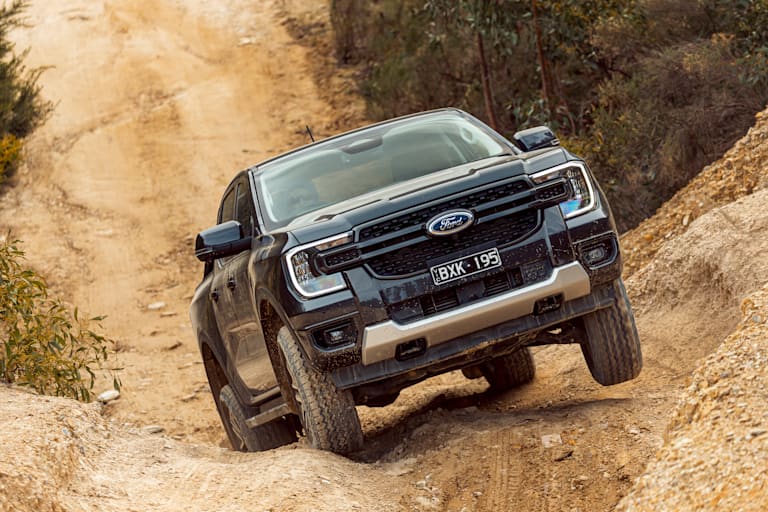
Playing with the drive modes and selecting the mud and ruts setting sharpened up the response of the ETC, but still it wasn’t as quick as the Toyota’s.
This again had me asking why, when you have selected low range and are obviously looking for the best tractive ability that a car can deliver, why the ETC wouldn’t automatically go straight to its sharpest and most effective setting?
The forward facing and 360-degree cameras available on the Ranger Sport’s 10-inch centre screen also proved to be a useful aid when driving off road and manoeuvring the car in tight spaces.
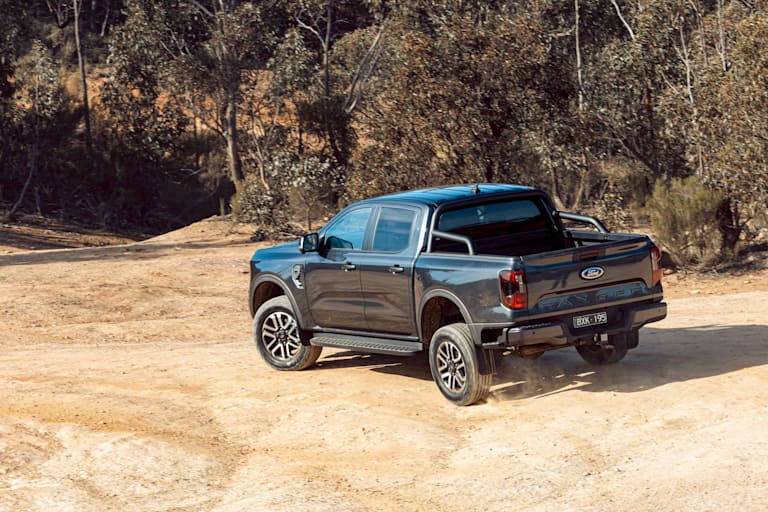
Cabin and accommodation
Stepping inside the new Ranger, passengers are greeted with an interior that raises the bar in the ute segment. It’s more modern looking and technically equipped than in the past, with a swag of features that will take some time to adapt to.
The aforementioned 10-inch screen takes pride of place in the centre of the dash and while it seems big for a ute, it’s the smaller of the two offered in the new Ranger. The Wildtrak models get a version of the portrait-style screen that is two inches taller.
The screen displays the usual things like maps and entertainment controls but also HVAC settings and off-road screen, and controls for exterior lighting. Thankfully Ford has included dials rather than buttons for the most used functions of audio volume and temperature controls.
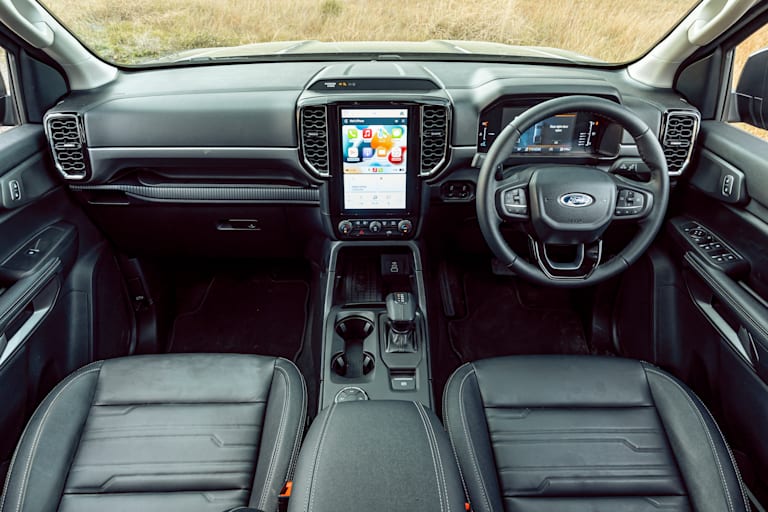
Beneath the screen is a wireless charging pad for your mobile phone from where it connects to Ford’s SYNC 4 system wirelessly for Apple CarPlay and Android Auto.
The dashboard reflects the blunt upright look for the Ranger’s new grille and headlamps, and now includes a handy little shelf forward of the front seat passenger and below the glove compartment for a convenient place to toss your phone, keys, wallet or whatever.
The driver sits behind a steering column that is now adjustable for both reach and height. Forward of the steering wheel is another large digital screen that is configurable to display the information you might want to see more often. You also get a full display of off-road settings up here when the off-road mode is selected.
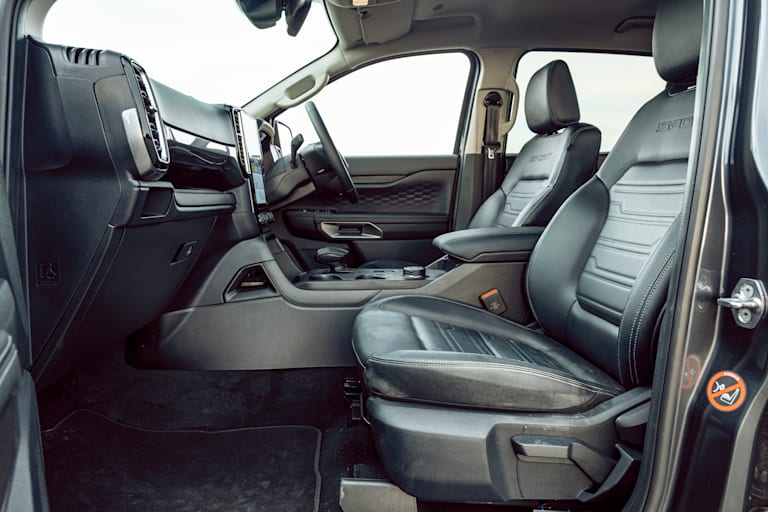
The Ranger has new seats across the model range and they have taller seatbacks that better follow the shape of your spine for improved comfort and safety. In the Ranger Sport they are leather covered and power adjustable in the front row, although you’ll need to step up to a Wildtrak if you want heated seats.
As the cabin is pretty much the same width as the outgoing model, the rear pew remains a tight squeeze for three adults across, but there’s plenty of headroom and adequate legroom. The new Ranger now has vents for the rear-seat passengers.
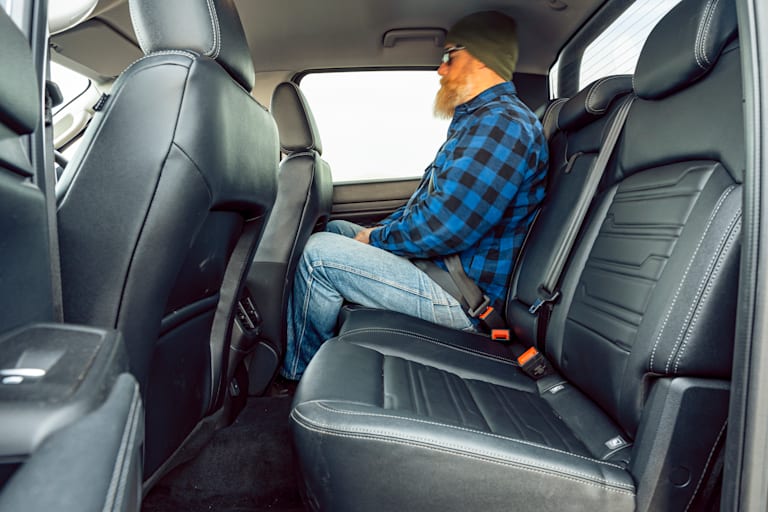
Practicalities
Ford listened to a lot of customer feedback on how Ranger owners used their utes and how the company could improve the experience. This led to things like the steps at the rear of the cargo tub sides to improve access to the back, exterior lighting changes, an integrated electronic brake controller for towing and a clever function that cycles through the lights so that you can check your trailer lamps.
On the Sport model as tested here, the integrated brake controller comes as part of a $900 optional ‘Touring Pack’ that also includes the 360° camera and four-zone exterior lighting. These features are standard on the Wildtrak.
The company didn’t forget the essentials like maintaining a 3500kg towing capacity, 6400kg GCM, close to a tonne payload (934kg in the Sport V6), 800mm wading depth, and better than average overhangs and clearance.
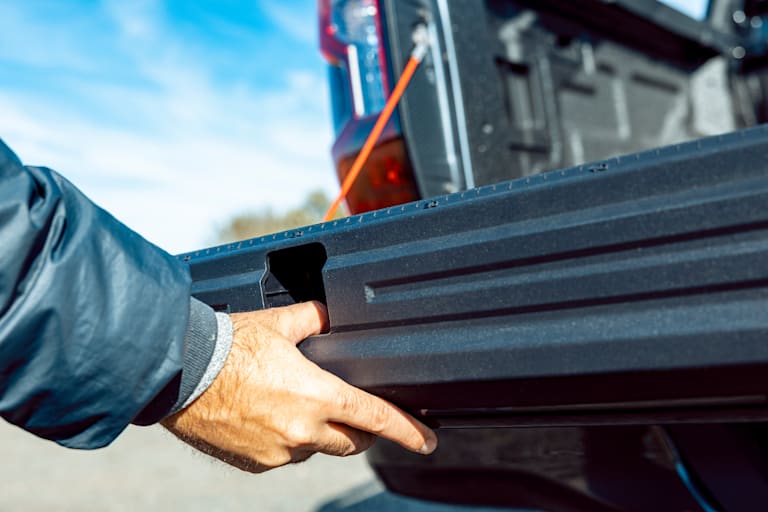
That wading depth is class leading, but we still question the forward-facing air intake for the engine that all Rangers now have and would be looking for an intake snorkel if it were our car.
Better news in the engine bay is the space for a second battery and the availability of a factory-backed kit from ARB.
The wider wheel track allowed a wider cargo tub that now accommodates a Euro pallet in-between the wheel arches, and also features LED lighting, four tie-down points, a 12-volt power outlet and an easy-lift tailgate. Things like the clamping points and ruler on the tailgate seem a bit novel, but we’re sure someone out there will find a use for them.
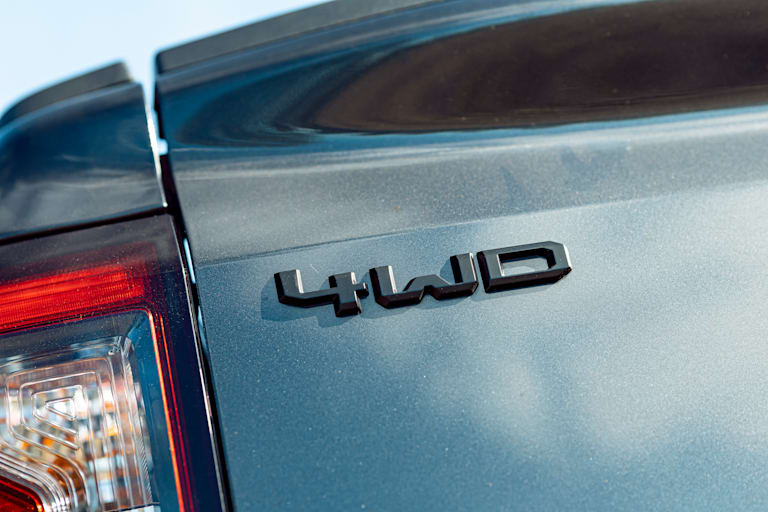
By teaming up with ARB to develop the factory-approved accessories for the Ranger, Ford is able to offer a range of kit that is unrivalled among its competition. Everything from a front Air Locker, bullbars and suspension kits to rear cargo storage, air compressors and canopies are available at the time of vehicle purchase.
Of course they will also be available from ARB stores who have a head start on developing kit for the Ranger, but you can bet the other leading manufacturers won’t be too far behind in developing their own accessories for such a high-demand vehicle.
Ranger Sport rides on 18-inch alloys wearing 255/65-section tyres so it shouldn’t be too hard to find tougher tyres for bush use, while there’s no reason you couldn’t fit the smaller diameter 17-inch wheels from the XLT or aftermarket.
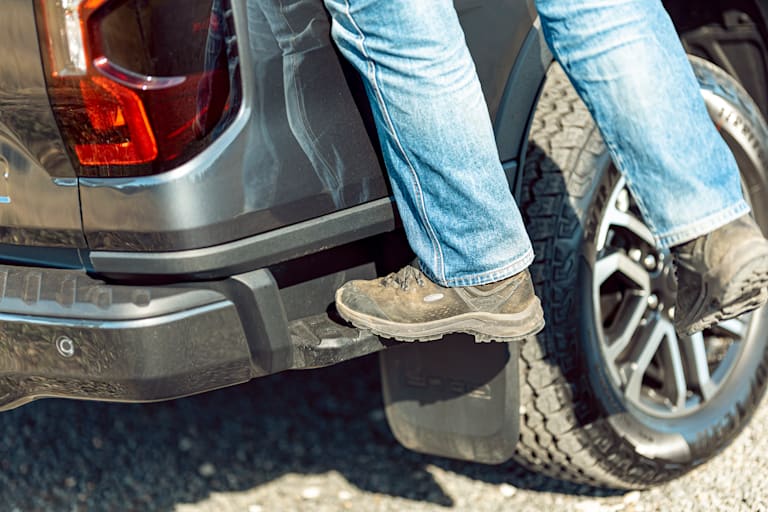
Toyota HiLux SR5 - Premium
WHILE the Ranger’s lineage is a bit harder to trace via its collaborations with Mazda and other changes over time, the Hilux’s is simple. This N80 Hilux is the eighth generation of Toyota’s mid-size ute, and over more than 50 years it has developed in to one of the world’s leading and most recognised vehicles.
The eighth-gen Hilux was introduced in 2015 and it was only back in 2020 when it received its latest updates including the all-important improvements to the 1GD-FTV engine.
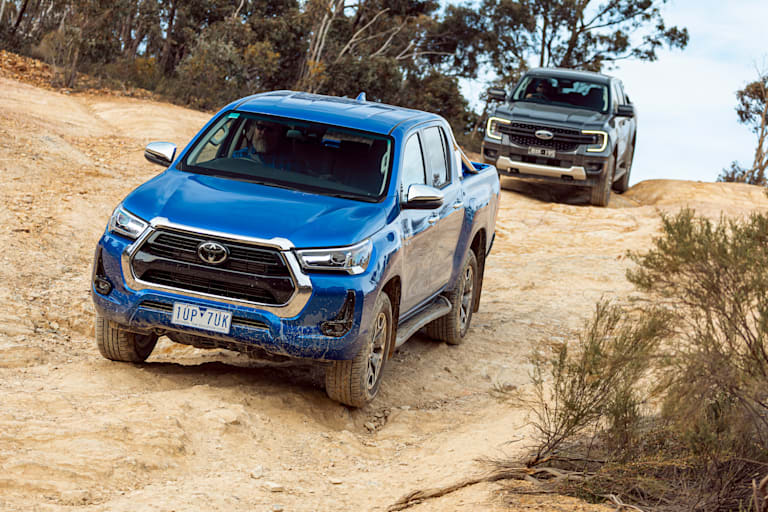
Powertrain and performance
THE 2020 upgrades to the Hilux range marked a significant improvement to its 2.8-litre diesel engine, notable in its outputs which jumped up to 500Nm to match Ford’s 2.0-litre diesel in the PX2 Ranger.
It wasn’t just about peak torque for the 1GR engine as the extensive upgrades improved the engine’s performance right through its delivery range, dramatically improving the Hilux’s drivability.
This was especially true when matched to the 6-speed automatic transmission where in the past, it had hunted through the gears while trying to find the sweet spot in the engine.
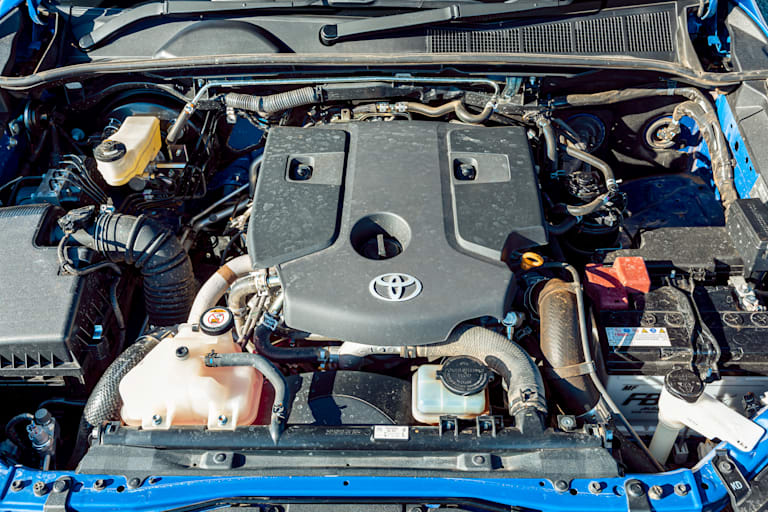
There’s none of that indecisiveness in the current iteration of the power train; the transmission is perfectly matched to the engine’s outputs proving that six speeds is enough for any vehicle. The engine is punchy and delivers plenty of grunt, placing it at the pointy end of the four-cylinder powered 4x4 utes in terms of performance.
While the 4-cylinder engine can’t compete with the V6 engine in terms of outright performance, where it really feels old school is in the noise and vibration it transmits to the cabin.
This leaves the Hilux, and any other 4-pot powered ute for that matter, feeling like the light trucks that they really are, while the V6 powered utes like Ranger and Amarok feel and sound more passenger car-like in the way their engines perform.
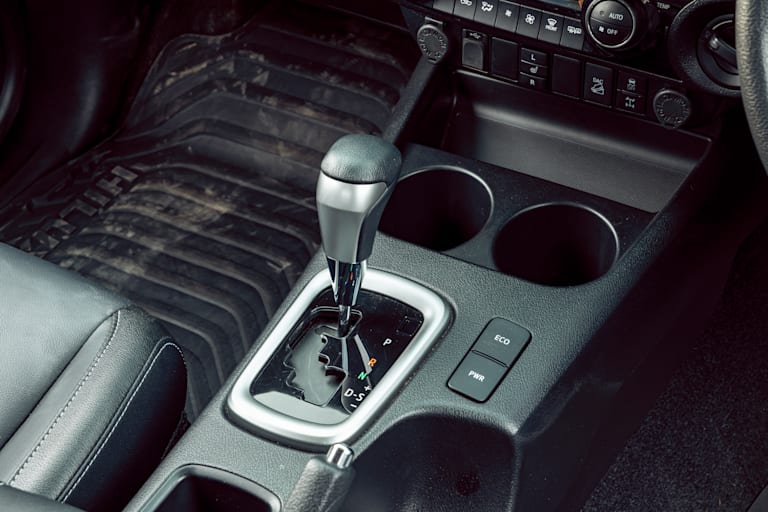
On-road ride and handling
THE V6 Ranger also leaves the Hilux feeling more light truck-like in its chassis and the way it drives on the road. Like the Ranger, the Hilux feels firm in its suspension and this is following Toyota revising the suspension in the past to soften the ride of the unladen vehicle.
But the Hilux feels taller and narrower in the way it sits on the road, as if it has a higher centre of mass than the Ranger. This probably has a lot to do with the Ranger’s wider wheel track giving it a more stable platform to ride on.
It’s interesting to see that Toyota is releasing a wider-track Hilux model later this year with an extra 120mm of width added to its 1535/1550mm front/rear wheel tracks. This should significantly change the way the ute feels and drives on road.
There’s nothing wrong with the way the Hilux rides and drives now, it’s just that newer utes are changing the way cars in this segment perform.
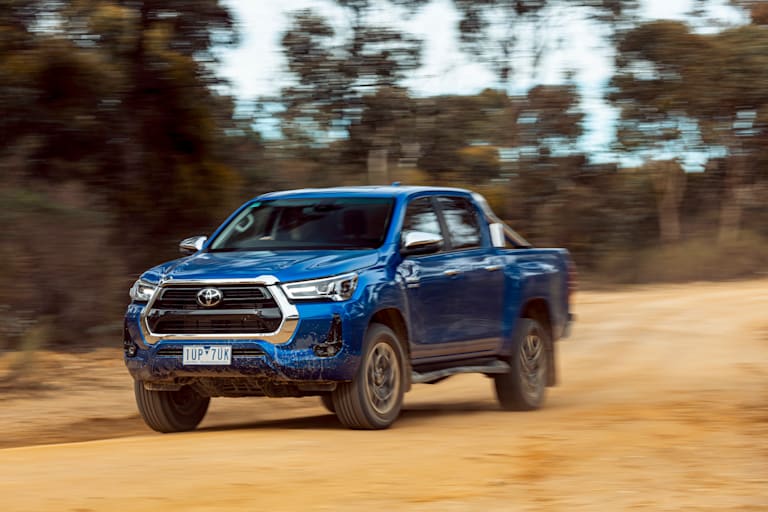
Off road
LIKE any Toyota 4x4, the Hilux’s strengths lie in its gravel road and off-road performance and Toyota has given the Hilux class leading rear-axle articulation and the sharpest ETC calibration in the segment to ensure it gets over most rough terrain.
On that rutted climb where the Ranger spun its tyres as it ascended, the Hilux didn’t kick up a bit of dust thanks to its superior tractive abilities without relying on any additional drive modes or buttons to get it there.
The tables are turned when the terrain requires a diff lock (RDL) though and engaging the Lux’s RDL kills the ETC across the front axle leaving the car a three-wheel drive instead of four.
And once one of the front wheels starts spinning, the front axle become useless so it relies on the locked rear end. As such, the Hilux will often get over tricky obstacles easier using just the excellent ETC and not engaging the RDL.
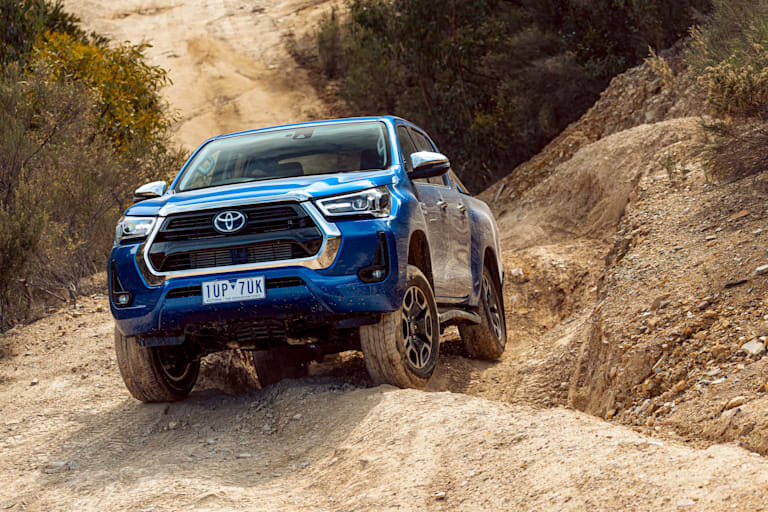
Cabin and accommodation
THE Hilux’s cabin is another part of the car that has been upgraded through the life of this eighth-gen model, and each time it is an improvement. The dash’s eight-inch screen was updated to give a dial for volume control and made easier to use, but many people we speak to don’t like the way the screen sits on the dash as opposed to being more integrated. Personally, I have no problem with it.
The gauge binnacle is much simpler than that of the Ranger, but still tells the driver everything he or she needs to know. In many ways I find the simpler dash easier to read than the Ford’s busy gauge screen.
The leather-trimmed seats that are the Premium package combine with the piano-finish black trims to add a feel of luxury and quality to the ute’s cabin and, unlike those in the Ranger Sport, the SR5 Premium’s front seats are heated.
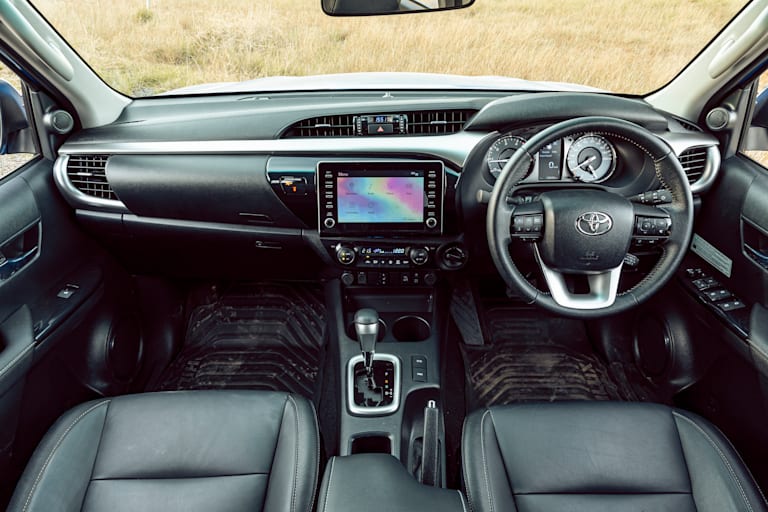
The rear seat in the Hilux is a tighter squeeze than that in the Ranger in all key dimensions: less headroom, legroom and shoulder space.
The Hilux also drops behind in not having all the latest safety technology. It has the essentials like ABS, ESC, ETC, AEB buts its lane-departure system doesn’t offer proper steering correction, nor does it have features like blind-spot indicators or rear cross-traffic alerts – all of which the Ranger has as standard.
This deficiency in safety tech is as much to do with the age of the current model Hilux when compared to newer models like the Ranger, Triton, BT-50 and D-Max.
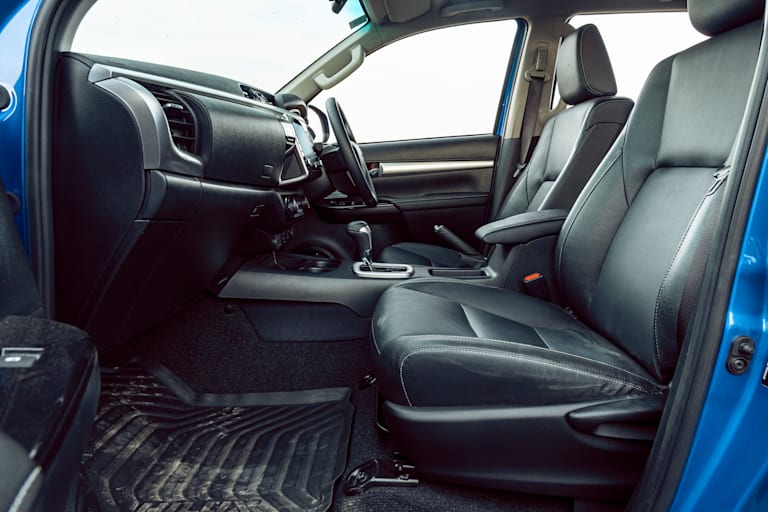
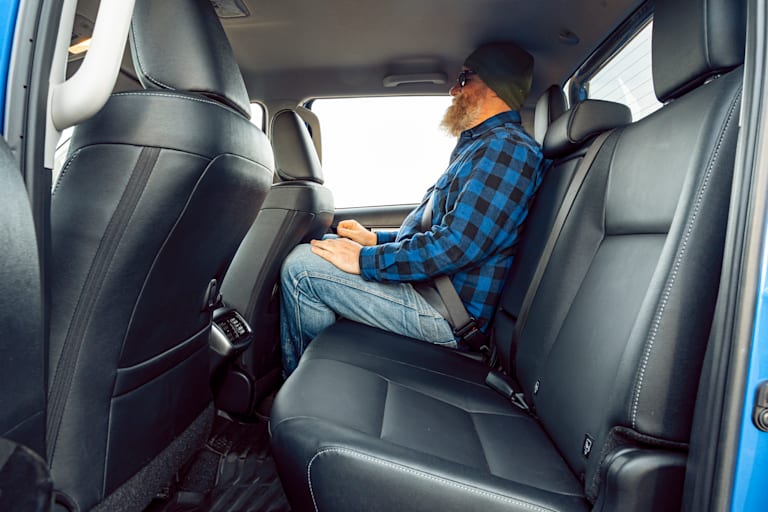
Practicalities
THE SR5 rides on 265/60R18 tyres which are becoming a common size for utes, but you can fit the smaller and more practical 17-inch wheels off the lower grades for better tyre choices.
The cargo tray is smaller than that of the new Ranger but has tie-down points low in the four corners and lacks the tub lighting or 12-volt power that the Ranger has. The Toyota’s tailgate feels like it weighs a tonne when compared to closing the assisted tailgate of the Ranger.
The Hilux’s engine bay has space for a second battery and the air intake is well-placed where it draws from the inner ’guard.
As one of the worlds most popular vehicles, the Hilux is extremely well-supported by aftermarket accessories manufacturers and Toyota offers a healthy range of factory kit for the ute including steel and alloy bullbars. If you can imagine a part you want for a Hilux, there’ll be someone somewhere making it for you.
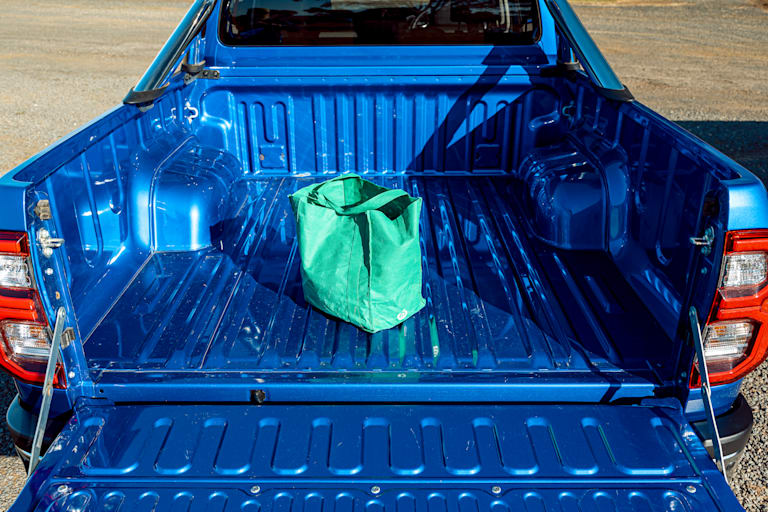
VERDICT
When driving these two utes side by side, there’s no hiding the fact that the Ranger is a new model, while the Hilux is the best part of seven years old. You feel the age difference in the way the two cars drive, the features and technology in them and the level of performance.
The V6 engine might only offer 100Nm more grunt but the way it delivers its torque through the rev band feels much more effortless, even though official numbers claim that the I4 Toyota engine has a wider spread of torque.
More than just the performance alone, the refinement that the V6 engine and 10-speed auto sets a new standard in the 4x4 ute category that nothing else comes close to.

Combine this with the tractability of the full-time four-wheel-drive system and its benefits on varied roads, and the Ranger is the better driving ute by a country mile.
Even without the V6 engine, the Ranger’s dynamics and comfort trump every other ute on the market, including the Hilux. Combine this with leading levels of safety and convenience features and the new Ford ute is hard to go past.
That’s not to say there’s anything wrong with the Hilux. It was only two years ago the Hilux, in this exact specification, won our 4x4 Of The Year award for its all-round competence and ability.
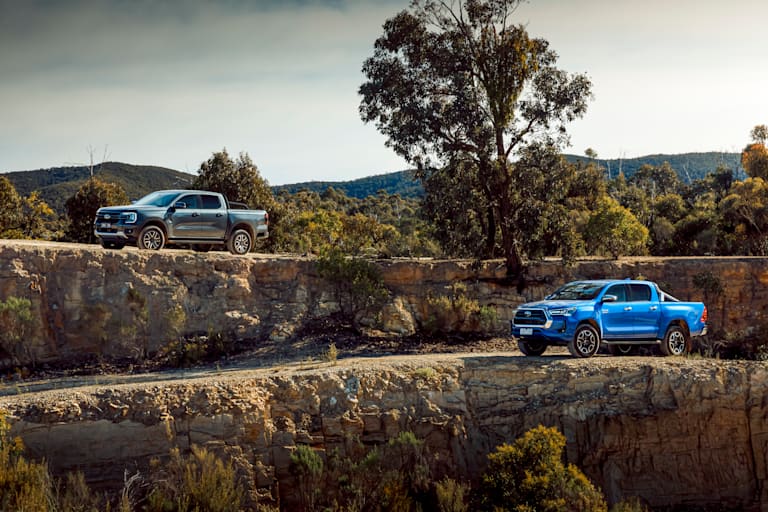
It might not do things amazingly well, but it does everything you need of it with nothing to let it down. Yes, it’s showing its age now, but Toyota is already promising upgrades to the N80 model before an all-new Hilux arrives in a few years’ time.
Will those upgrades to Hilux be enough to combat the onslaught of the new Ranger; we think not. Not without a new, more refined and powerful engine package at least.
So for now – the Ford Ranger sits at the top of the ute segment and it will come down to which of these two titans of the industry can get the supply of product in to meet customer demand, that determines which of them will be Australia’s best selling 4x4 in 2022.
SCORING
HiLux SR5: 8/10
What we like
- Excellent ETC calibration
- Solid construction
- Value for money
Not so much...
- Narrow chassis and cabin
- Noisey engine
- Lacking latest safety equipment
Ranger Sport V6: 9/10
What we like
- Refinement of powertrain and chassis
- Chassis dynamics
- Levels of standard equipment
Not so much...
- No manual transmission offered
- So much fiddly tech
- Electric parking brake
| Toyota Hilux SR5 – Premium | Toyota Hilux SR5 – Premium | Ford Ranger Sport V6 |
|---|---|---|
| Price | $63,320 | $66,690 +ORC |
| Engine | I4 diesel | V6 diesel |
| Capacity | 2755cc | 2993cc |
| Max Power | 150kW at 3400rpm | 184kW at 3250rpm |
| Max Torque | 500Nm from 1600 to 2800rpm | 600Nm from 1750 to 2250rpm |
| Transmission | 6-speed automatic | 10-speed automatic |
| 4X4 System | Part-time w/ high and low range 4x4 | Full-time 4x4 offering 2WD, 4x4 auto, 4x4 high range, 4x4 low range |
| Crawl Ratio | 36.11:1 | (Awaiting details) |
| Construction | 4-door ute body on ladder chassis | 4-door ute on ladder chassis |
| Front Suspension | IFS w/ dual control arms and coil springs | Independent via wishbones and coils |
| Rear Suspension | Live axle riding on leaf springs | Live axle on leaf springs |
| Tyres | 265/60R18 on alloy wheels | 255/65R18 on alloy wheels |
| Kerb Weight | 2093kg | 2264kg |
| GVM | 3088kg | 3280kg |
| GCM | 6588kg | 6400kg |
| Payload | 995kg | 934kg |
| Towing Capacity | 3500kg | 3500kg |
| Seats | 5 | 5 |
| Fuel Tank | 80L | 80L |
| ADR Fuel Claim* | 8.1L/100km | 8.4L/100km |
| On-Test Fuel Use | 11.6L100km | 11.4L/100km |
| *Australian Design Rule ‘Combined-Cycle’ Claim |
| Off-road specs | Toyota Hilux SR5 – Premium | Ford Ranger Sport V6 |
|---|---|---|
| Departure Angle | 28° | 25.6° |
| Rampover Angle | 00° | 00° |
| Approach Angle | 29° | 30° |
| Wading Depth | 700mm | 800mm |
| Ground Clearance | 216mm | 000mm |

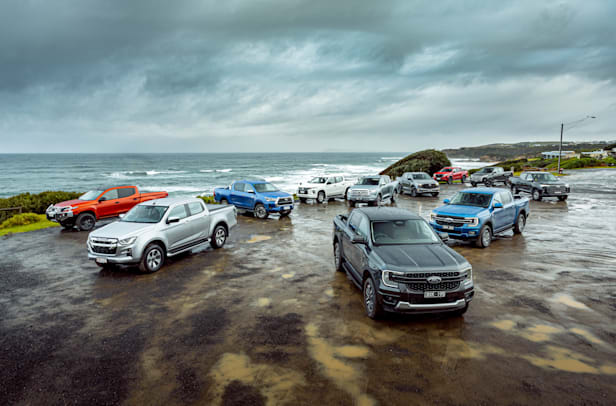

COMMENTS